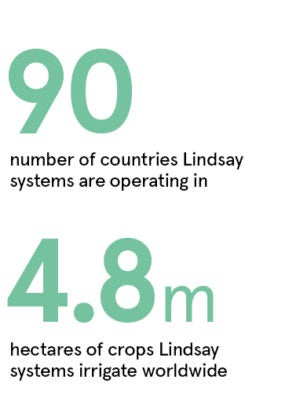Water is becoming an increasingly important topic of conversation, whether it’s too much because of flooding or too little through drought. With climate change exacerbating the age-old conflict of the food-energy-water nexus, farmers must find new technologies and processes to address old problems – they need to get smart.
This means taking advantage of the new technologies which are transforming industries around the world. Lindsay Corporation has put 40 years of crop and irrigation research into FieldNET. This is a proven technology platform, leveraging volumes of big data, cloud-computing capabilities and machine-learning to deliver growers one easy-to-use tool. It means real-time data can be used to understand and respond to conditions on the ground.
As John Atkinson, director of international business development at Lindsay Corporation says: “Our technology, more effectively than any other in the industry, is helping growers meet the increasing demand for food, feed, fuel and fibre production through maximising the efficiency of irrigation. Doing this saves water and energy, cuts carbon emissions, all the while helping growers scale up their output or yield. This is beneficial to individual farmers, but it also ensures sustainability and stewardship of the land and environment.”
Irrigation is the most basic factor in agriculture because its inadequacies are the most powerful constraints on any increase of agricultural production. When things go wrong, the effect can be dramatic. Research from the World Bank has estimated that since 2001 rainfall shocks have caused a loss of food production sufficient to feed some 81 million people, the equivalent of the population of Germany, every day for an entire year.
There is also extreme pressure on farmers to continue to drive output, in large part driven by a global growth in demand. The United Nations Food and Agriculture Organization has forecast that the world will need to increase output by 70 per cent, just to feed the estimated nine billion population expected by 2050.

Effective water management through irrigation can not only mean effective responses to fluctuations in the water supply, but also that higher-yielding hybrids can be used to take full advantage of the full growing season. In the end this all means one thing – higher returns.
Agribusiness is under pressure from a number of different directions, as every operation has to manage complexities and unique needs that require balancing profitability, environmental regulations, expansion and competition. At Lindsay Corporation, the focus is on ensuring that water is managed effectively to protect farming investments and drive return on investment. Mr Atkinson concludes: “Our offering is unique because it is turnkey and fully integrated – it’s not multiple systems cobbled together – ours is a single system, with a single source of support from start to finish.”
What makes Lindsay special is its FieldNET Advisor tool, a cloud-based irrigation management system which delivers automated irrigation recommendations, which can be customised down to the individual field and zones within the field. In a trial, when compared to the control field, FieldNET Advisor provided a 3 per cent yield increase while using 17 per cent less water. Overall this resulted in almost $35 per acre increased profit. Farmer Kendall David says: “FieldNET and FieldNET Advisor are game-changers towards creating sustainable irrigation practices.”
As a turnkey solution, Lindsay doesn’t just support farmers in managing irrigation, it offers a complete service for landowners wishing to convert land to productive agricultural use. Lindsay provides access to whatever might be needed, from research and feasibility studies to custom engineering and design of optimised irrigation systems, the hardware needed to make it work, and the technology layer, which delivers not only the water and energy savings, but also ensures efficient operations through time-savings.
For agribusiness, long-term, effective management and sustainable irrigation could be the difference between success and failure.
For more information please visit lindsay.com

